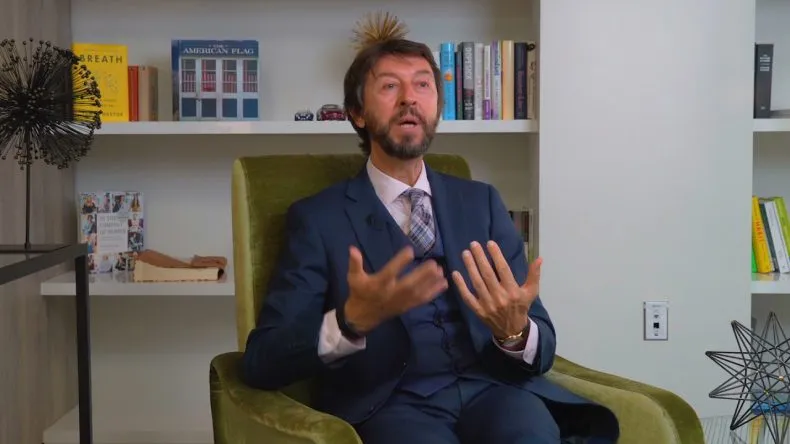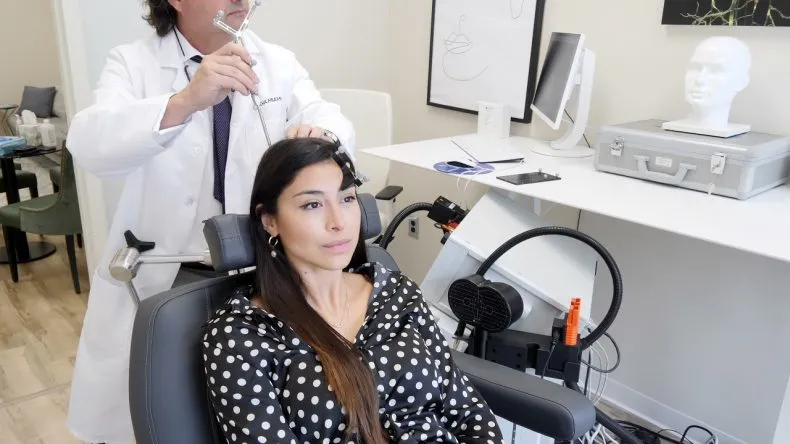Are you looking for TMS Therapy in Florida? Our Treatment Center GIA offers the most advanced and up-to-date, evidence-based treatment approaches tailored to suit your needs. Our outpatient facilities are in the heart of Miami, providing convenience and accessibility for every patient.
TMS Therapy Florida Miami – A Pioneering Mental Wellness Treatment
Transcranial magnetic stimulation (TMS) is a non-invasive and FDA-approved therapy that uses gentle magnetic pulses to stimulate areas of the brain. For more than three decades, millions of people have benefitted from it. For people living with depression, anxiety, addiction, and other mental disorders, certain parts of the brain are underactive or overactive. Stimulating them can have pronounced effects on mood, cravings, and other symptoms.
The path to mental wellness is different for everyone. For most people, the most effective treatment programs involve a combination of evidence-based therapies, along with compassionate care and personal support.
TMS provides a complementary or alternative approach to behavioral therapies, medicines, and support groups that can revolutionize your recovery journey. It can produce significant changes in patients where other treatment options have failed – TMS can be life-changing.
- Tms Therapy Florida Miami A Pioneering Mental Wellness Treatment
- How Does TMS Therapy Work
- Can I Benefit From TMS Therapy
- What Can I Expect From TMS
- What Is TMS Therapy Used For
- TMS For Anxiety Disorders
- TMS For Depression
- Tms For Alcoholism Tms Florida
- Tms For Nicotine Addiction
- Tms For Bipolar Disorder
- Tms For Teens And Kids
- What Is Deep TMS Therapy
- Is TMS Therapy Covered By Insurance
- How Much Does TMS Therapy Cost
- Is Tms Treatment The Same As Shock Therapy
- Who Should Avoid Tms Treatment
- What Are The Side Effects Of Transcranial Magnetic Stimulation
- Mental Wellness Treatment And Neurodiversity Tms Therapy Near Me
- What Is The Success Rate Of TMS Therapy
- How Many Sessions Does It Take For Tms To Work
- Is Tms Painful
- Will Tms Work For Me
- Can Tms Make You Worse
- Can Tms Damage Your Brain
- What Does Tms Therapy Feel Like
- Can Tms Change Your Personality
- How Long Does Tms Therapy Last
- How Long Does It Take For Tms To Start Working
- Is Tms Treatment Safe
- Tms Treatment Near Me In Miami Fl
How Does TMS Therapy Work? TMS Therapy South Florida
TMS works by passing electrical pulses over the surface of the head. These pulses flow painlessly through the scalp and reach the brain cells beneath. In general, slower pulses calm brain cells down, while faster pulses make them more active. These changes in cell activity can have notable effects on both mood and behavior.
TMS is a safe and effective therapy that the FDA approved in 2008 as a treatment for clinical depression. It has far fewer side effects than most medicines – the most common side effect is mild to moderate scalp discomfort that quickly goes away.
Can I Benefit from TMS Therapy? South Florida TMS Center
Medical doctors, psychologists, and therapists initially used TMS as a treatment for clinical depression to increase activity in certain areas of the brain. Since then, experts worldwide have recognized the potential of TMS to treat other mental disorders which cause or result from brain changes.
Pioneering clinical studies by GIA’s founder Dr. Antonello Bonci and collaborators created strong evidence for the effectiveness of TMS in aiding recovery from substance use disorders, including alcohol, cocaine, pathological gambling and nicotine addictions. Dr. Bonci and colleagues worldwide continue their research daily to increase our understanding and optimize the technique to help patients in their recovery journey.
At GIA Miami, we offer TMS to treat depression, anxiety, substance use disorders, as well as TMS for OCD, TMS for PTSD, and postpartum depression.

What Can I Expect from TMS?
TMS is a non-invasive procedure with no long-term side effects. You remain awake throughout the session and can communicate with the therapist at all times. The experience is simple and painless, and you can drive yourself to and from sessions.
Related Article: What is TMS Therapy
Your TMS session will begin with a ‘mapping session’ where the therapist uses magnetic pulses to find the location and intensity of the stimulation that you need.
Once they have found the location, they begin to stimulate the cells. Sessions typically last twenty to fifty minutes, five days a week, over the course of four to six weeks.
What Is TMS therapy Used For?
TMS can play a role in treating a range of mental disorders, especially for clients who have been resistant to other forms of treatment. It can be a life-changing experience that turns a client’s recovery journey around.
TMS for Anxiety Disorders
As touched on above, clinical trials have demonstrated that TMS produces promising results in clients with anxiety disorders, including OCD and PTSD.
Recent research suggests that using a high-frequency pulse on the right side of the dorsolateral prefrontal cortex is most effective in treating anxiety disorders. Still, high and low-frequency pulses on both sides of the brain may also offer good results.

TMS for Depression
The FDA has approved transcranial magnetic stimulation as an effective treatment for major depressive disorder, leading to long-term improvements in mood and behavior. Research has also found that over 50% of people living with clinical depression may benefit from TMS therapy.
TMS can improve depression symptoms in clients with treatment-resistant depression who have not responded to other depression treatments like antidepressant medications or talk therapy. It also has far fewer side effects than antidepressant medication, which can lead to weight gain and high blood pressure.
TMS for Alcoholism – TMS Florida
The founder of GIA, Dr. Antonello Bonci, and other world-leading medics have led pioneering research into the effectiveness of repetitive TMS as an addiction treatment. Dr. Bonci co-authored an efficacy review that found TMS treatment can reduce alcohol consumption and increase days of abstinence as part of a treatment program for alcohol use disorders.

TMS for Nicotine Addiction
Randomized clinical trials have shown TMS to effectively treat nicotine addiction, reducing daily cigarette smoking. Clients may participate in TMS therapy alongside other treatment approaches, such as nicotine patches or talk therapy.
TMS for Bipolar Disorder
TMS can be an effective treatment for symptoms of bipolar disorder as it can increase the excitability of brain activity in the target area of the brain, improving symptoms of depression.
While studies have found that it may induce manic or hypomanic symptoms through stimulation, almost all bipolar disorder treatments carry this risk.
TMS for Teens and Kids
Mood disorders like depression are widespread among children and teens across the world. Inadequate treatment can lead to conduct disorders, substance abuse, illness, poor performance at school, and a greater risk of suicide.
The good news is that depression in teens is treatable and can open the doors to the future they dream of. TMS therapy can be an effective treatment for young people with depression, and the procedure’s minimal side effects and accessibility make it an attractive option for young people who may want to fit TMS treatment alongside their work or studies.

What Is Deep TMS Therapy?
Deep TMS therapy is a form of TMS therapy that uses special combinations of coils. These coils produce electromagnetic pulses that reach below the surface of the skull, and different coils are used to reach each brain region.
The FDA has approved deep TMS with the ‘H1’ coil for the treatment of people with treatment-resistant depression who have not responded to psychotherapy or medicine.
Is TMS Therapy Covered by insurance?
Most insurance plans will also cover TMS under certain conditions, especially as a treatment for depression. GIA Miami can work with insurance companies to determine the level of coverage and handle any necessary paperwork.
Related topic: TMS Therapy for Stroke Patients

How Much Does TMS Therapy Cost?
TMS therapy can be one of the most cost-effective treatments for depression and other medical conditions. Many insurance providers cover TMS therapy under certain conditions. We accept a number of insurances as well as have payment options. To get more information contact us. We are available 24 hours a day.
Is TMS Treatment the Same As Shock Therapy?
Electroshock therapy (ECT) involves applying electrical currents directly to the client’s head when they are sedated by anesthesia. While it can lead to short-term cognitive improvements, it is an invasive procedure that may require someone to take a break from work and home responsibilities.
On the other hand, TMS therapy is non-invasive, passing electromagnetic currents through the skull. It is completely pain-free and has few side effects other than a temporary mild headache or skull discomfort.

Who Should Avoid TMS Treatment?
Clients who have permanent metal implants in their heads other than dental braces or fillings should not receive TMS therapy. The electromagnetic signals could cause these implants to heat up, move, or function incorrectly, risking injury or death.
Implants that prevent a client from participating in TMS therapy include:
- Deep brain stimulators
- Aneurysm coils or clips
- Tattoos on the face with metallic or magnetic ink
- Electrodes that monitor brain activity
- Any other metal medical devices or objects in or near the head
Those considering TMS treatment should also speak with a doctor if they:
- Take any medication
- Have a history of seizures
- Have a family history of epilepsy
- Live with co-occurring mental disorders
- Have a brain injury
- Have had other medical conditions
- Have previously been treated with TMS
- Are pregnant or thinking of becoming pregnant
What Are the Side-Effects of Transcranial Magnetic Stimulation?
Side effects of TMS treatment are usually mild to moderate and improve soon after each session. They also tend to decrease as clients participate in sessions throughout their treatment.
Common side effects may include:
- Headache
- Scalp discomfort
- Tingling, spasms, or twitching of facial muscles
- Lightheadedness or dizziness
Though these side effects are mild, doctors may be able to reduce them by adjusting the intensity of the magnetic fields. There is currently not enough evidence regarding the long-term side effects of TMS treatment.

Mental Wellness Treatment and Neurodiversity – TMS Therapy Near Me
Neurodiversity refers to the difference between the parts of the brain that impact the way people socialize, learn, feel, and behave. Neurodiversity supports the view that when a brain functions differently, it is not a disability or an illness that needs to be treated. Instead, those struggling should think about adapting their social structures to accommodate their differences. People living with autism (TMS for Autism), Parkinson’s, attention deficit hyperactivity disorder (TMS for ADHD), and other conditions may describe themselves as neurodiverse.
At GIA Miami, our treatment programs accommodate neurodiversity. We recognize that neurodiverse clients may experience conditions and respond to treatments differently. Our experts consider neurodiversity when designing treatment plans which may include TMS therapy.
What Is the Success Rate of TMS Therapy?
The success rate of TMS therapy depends on the medical conditions it is being used to treat. For many conditions, scientists need to do more research to determine accurate rates. However, the evidence so far is very promising.
Research has shown that up to 62% of people living with depression experience complete remission, meaning that they no longer experience any symptoms of depression. Other studies have found that symptoms of anxiety improve by 33%.
How Many Sessions Does It Take for TMS to Work?
Every client is different. Some clients may notice small changes in a standard course of TMS after one to two weeks (5 – 10 sessions), while others start to see improvements in the fourth or fifth week (20 – 25 sessions). It’s recommended that clients complete an entire course of treatment regardless of when they first see improvements.
Is TMS Painful?
Transcranial magnetic stimulation (TMS) is a relatively painless procedure that can be a lifeline for clients struggling with their mental wellness. It is a safe and non-invasive procedure with fewer side effects than other treatment options.
Will TMS Work for Me?
Many people try TMS when other treatment methods do not work. It can be a life-changing experience, with two-thirds of people achieving complete remission after treatment. But it is important to note that the TMS experience does not work for everyone.
Contact us today to learn more about TMS and discuss whether it is the best alternative treatment method for you.
Can TMS Make You Worse?
There is no evidence that Transcranial Magnetic Stimulation can worsen symptoms of any condition the treatment is often prescribed for. However, it is possible that people with conditions TMS is not a treatment for, may experience negative effects. Clinical studies of schizophrenia and bipolar disorder show mixed results.
Can TMS Damage Your Brain?
TMS is entirely non-invasive. Therefore it does not require any form of surgery or the implantation of electrodes. There is no evidence that TMS treatments damage the brain in any way, as long as a person has been confirmed a suitable candidate for TMS by their primary care physician, TMS provider, or other qualified doctor.
What does TMS Therapy feel like?
The physical sensations experienced by patients during a treatment session are like moderate tapping or knocking on the skull, caused by the magnetic pulses generated by the TMS machine. While few patients would describe TMS as actually pleasant, it is not uncommon for people to doze off during treatment, and even those who enjoy it least would most likely describe it as unpleasant rather than actually painful.
Can TMS Change Your Personality?
TMS cannot fundamentally change your personality, either temporarily or permanently.
By alleviating symptoms of major depression and other mental health concerns, TMS may lead to significant changes in mood and behavior. However, rather than changing your personality, TMS helps you reconnect with your inner-self, rediscover your passions, and express yourself to the full.
How Long Does TMS Therapy Last?
A typical course of TMS therapy consists of daily sessions for six to nine weeks. Some providers may reduce the frequency of sessions towards the end of the TMS treatment process, while others may offer twice-daily sessions.
Most TMS sessions last from 20-40 minutes. Your first treatment session, known as the mapping session, is usually a little longer.
How Long Does It Take for TMS to Start Working?
There is significant variation in the time it takes for clients to experience the first improvements. While some clients notice results in the first week, others may see changes in the fourth or fifth week. If you notice improvements later than other people, this does not mean that the treatment is ineffective.
Is TMS Treatment Safe?
TMS is a safe, non-invasive treatment that is FDA-approved for major depression. TMS also has very few side effects than other treatment methods like antidepressant medications.
The most common side-effects of TMS treatment are mild to moderate scalp discomfort at the treatment site and temporary headaches at the end of a session. These side effects often reduce as you progress through the treatment course.
TMS Treatment Near me in Miami, FL
TMS can be a life-changing treatment for a range of mental disorders. It enables many to resume normal activities, such as work and home responsibilities, as soon as their session ends.
To find out more about TMS therapy, contact us today for a free consultation.
Area we support: Miami-Dade, Miami Gardens, Wynwood, Little Havana, Brickell, Bay Heights, Little Haiti, Edgewater, Overtown, Watson Island, Little River, Buena Vista, Southwest Coconut Grove, Morningside, Upper East Side, Spring Garden, Coral Way, Town Square, Miami Design District, Brickell, South Beach, Miami Shores, Hollywood, West Palm Beach, Palm Beach Gardens and TMS Therapy Chicago
Read in Spanish: TMS Tratamiento









